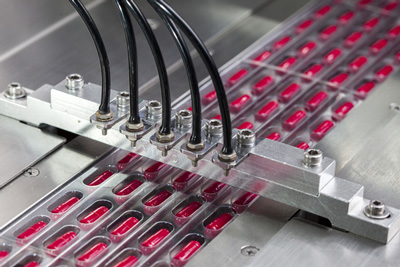CPhI Worldwide reviews the Spanish pharma market
Posted: 18 December 2015 | | No comments yet
CPhI Worldwide has announced the findings from a comprehensive review of the Spanish pharma market following the closing of its most successful ever CPhI Worldwide to date in Madrid last month…


CPhI Worldwide has announced the findings from a comprehensive review of the Spanish pharma market following the closing of its most successful ever CPhI Worldwide to date in Madrid last month (13-15 October 2015).


The survey amongst key companies in Spain’s pharma supply and manufacturing sectors shows that, despite recent falls in overall value, the country’s manufacturers are now targeting increased FDI and exports – primarily to Latin America and Europe, but also increasing to the USA.
CPhI Worldwide is a global hub for insight and analysis and is increasing the key barometer of the industry’s future direction and health. Following the event, we have summarised the hot topics and emerging trends in Spain. Some 36,368 professionals and 2490 exhibitors attended CPhI Worldwide in Madrid, and thanks to this success, and renewed buoyancy in the Spanish pharma market, the event will return in Barcelona for 2016 – home to a thriving biotech and manufacturing cluster ripe for investment.
One of the main growth opportunities to emerge from the surveys is that Spain retains an enormous amount of early stage innovations, but has until recently lacked the capital to take these into development and commercialisation. However, with the easing of financial conditions from ‘la crisis’, and initiatives to encourage local and international funding we should see more projects moving into later stage work. For example, the Spanish Bioindustry Association (ASEBIO) stated it is now working towards helping establish ‘fiscal incentives’ for innovation and is encouraging the Government to create ‘centres of excellence’ to fully capitalise on the market’s potential.
Generic exports continue to grow rapidly
Another notable trend reported is that as the overall domestic market shrank, generic exports have continued to grow rapidly (30-40%) over the last 5-years. This trend is forecast to continue, as by European and US standards, manufacturing and labour costs remain highly competitive. Led by the successful international sales from companies like Esteve, Grifols and Gropo, a new wave of SMEs are targeting exports to Europe and Latin America. Whilst some of the longer established companies, with FDA approved GMP sites, are also looking to gain increased traction in the United States.
Farmaindustria, the national association for the pharmaceutical industry, states opportunities are uneven between national and multinational providers. The director general, Humberto Arnés, added: “Our national companies are related in terms of their geographical reach – Europe being the most important [currently] – and there is still much work to do in internalizing them. The industry needs to generate trust from investors to build a predictable Spanish market and export platform. But Spain is well positioned to grow.”
Next year at CPhI Worldwide in Barcelona, a new collated event in Finished Dosage Formulation (FDF)will launch and is designed to bring the entire supply chain together in one global location, from Big Pharma and CMO, to out-licensing specialists, end product distributors, end-user agents, and home markets. In fact, the CPhI findings highlighted that Life Science investment in Barcelona has doubled in recent years and nearly half of all R&D in Spain is located in the region.
Across the APIs and intermediates market, companies are also reporting increased confidence in sales growth, particularly for products beyond the $100/Kg threshold, with oncology and high potents attracting the attention of many manufacturers.
Generics represent a major area of future growth for the Spanish pharma market
Overall, the market remains somewhat ambivalent about generics, with price referencing forcing patented products to match the price of generics on introduction to the market, which is providing significant marginal problems for both product classes. However, in the longer term, with less than 50% of pharmaceutical volumes (38%) and only 18% of value, clearly generics represent a major area of future growth to bring Spain inline with other major European nations – whose use of generics, by volume, averages 55% (25% average by value). This revenue expansion opportunity is also being strongly supported by generic manufacturers moving towards exports and new markets, where there are less price restrictions.
“We have held several successful CPhI events in Spain over the last decade, but the sense of optimism and opportunities in the local and international market this year was particularly noticeable. Spain, as our survey notes, is split into two key pharma hubs and its hugely exciting to be moving to Barcelona next year – a region we feel is primed to become increasingly significant within the industry. What’s more, with the growth in finished formulation dosages, it was also the ideal time to introduce a new dedicated zone, more details of which will be announced in the New Year,” said Rutger Oudejans, Brand Director Pharma at UBM EMEA.




